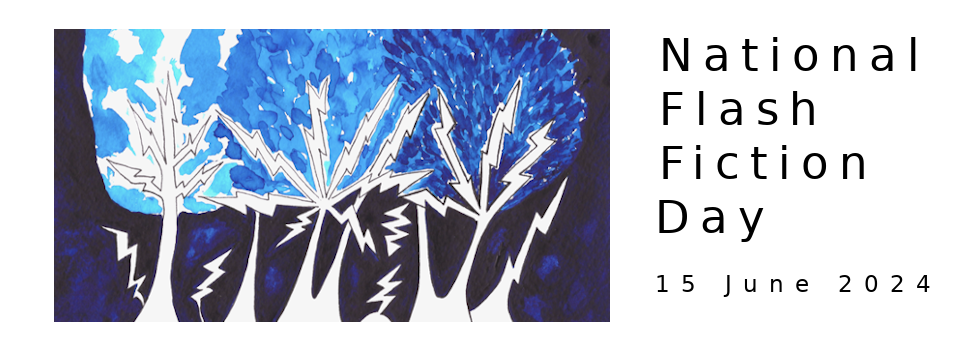The man was rude to his wife, mostly. But she loved him all the same, loved him as much as when they’d met - her, fresh out of college, him with flecks of grey already creeping into his hair. Decades on, she was still young, black haired, funny, smart. And she was good at her job, well liked by those she managed, and she earned a good wage. Still, when she came home he’d often ignore her, or choose to grunt instead of speaking.
She loved to cook, and she loved to cook for him – and she was good at it, and not just at your average meal. Her teriyaki was as good as her hot pot and her madras was as good as anything. But mostly, despite cleaning his plate, he’d be rude, critical, grumpy.
‘It’s fine,’ he’d snap if she pushed him for a verdict on something new or recently perfected.
He was retired, had been for years, and his days were predictable, but she still asked him about them.
‘How was your day?’ she’d say, a warm smile on soft lips.
‘Fine.’
She’d ask, ‘Been in the garden? How are the plants?’
Sometimes, if he was in the right mood, he’d tell her what he’d been doing, tell her what he planned to do, use words like compost, borders, trimming, pruning, and colour.
He loved his garden, and not just because he enjoyed the work, or because he appreciated the exercise and fresh air, or because he loved its smells and colours. He and his plants were friends. He’d talk to them, tell them secrets. Give them instructions – explain when to bloom, and for how long, show them why they should adjust the angles of their stems, which way they ought to face. And the plants listened. But this was a secret. No-one could know.
The man’s wife knew. Not that she said anything, if it made him happy then fine.
She’d seen him a number of times, watched him from their kitchen window, seen him with his head inclined towards a hanging basket, nodding as he spoke to it, or with his hands on his hips, chatting to their cherry tree. One day she’d come home to find him on his knees, arms waving, conducting their bedding plants.
The first time she mentioned it to him was on the day he died.
He’d become grey and thin very quickly; he had begun to look like an old man, and she, his wife, was worried.
She found him in their room. He was cupping the head of a poinsettia, whispering to it tenderly and with enthusiasm. She heard him tell it her name.
‘Hi,’ she said, ‘How are you doing?’
‘Fine,’ he said.
‘Is it true what they say?’ she asked, easing herself onto their bed, ‘Does it help them grow?’
‘Some people think so,’ he told her.
‘What do you say to them?’ asked his wife, patting their mattress, inviting him to join her.
He straightened and smiled. The mattress creaked under his weight.
‘Ever think what you’ll do when I’m gone?’ he asked.
‘Don’t be silly! There’s life in you yet,’ she said, that warmth on her lips, hoping.
‘I think about it,’ he continued. ‘You’ll be a long time without me.’
‘Don’t talk like that.’
‘Wish I was younger,’ he said. ‘Or that you were older. Big gap between us.’
The man’s wife hushed him. She didn’t want to hear this.
‘So the flowers,’ she said. ‘What do you tell them?’
‘Secrets,’ he said. ‘Instructions. Things they need to remember once I’ve gone. And they will, you know,’ he told her, smiling, ‘Just you wait.’
She pulled him close and held him, because she loved him. They lay together that night, old next to young, man next to wife. He told her he loved her and that he always would - and that she should believe what he said about the flowers - and he apologised for being grumpy most of the time and explained that it was because he felt guilty for being so much older - and he said that he thought he was selfish and she told him to sshhh.
In the morning he was dead, died in his sleep.
With a funeral to arrange and friends and relatives to deal with and wills to action - and everything else that comes with losing a husband - the woman, now a widow, didn’t think about the flowers or about what her husband had said. She went weeks once without watering them.
She was in the garden when it came back to her, she was just there, just breathing, when she noticed that the flowerbed was different – its flowers made shapes. Letters. Words.
The words spelled her name, they spelled ALWAYS and, at the end, after the blues and yellows and pinks that formed the name of her husband, they made an X.
BIO
Nik Perring is a short fiction writer from the UK. His stories have been collected into books (Not So Perfect (Roast Books) and (with Caroline Smailes) Freaks!(TFP?HarperCollins)), published in many fine places all over the world, been used on a distance learning course in the US and a number of other cool things. His online home is here (http://nikperring.com) and he’s on Twitter as @nikperring and he’d love you to say hi.
